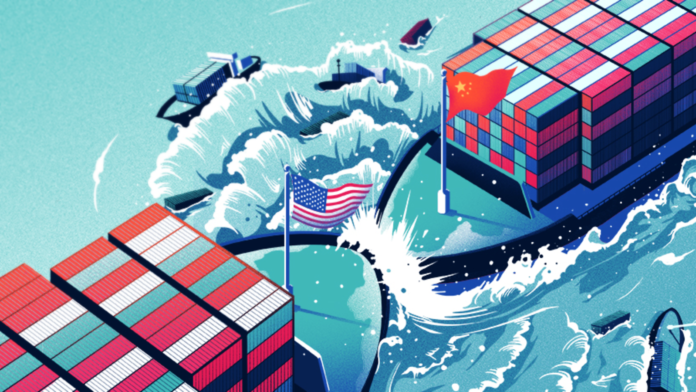The lingering trade war between U.S and China is stirring some more serious concerns among foreign and Chinese firms.
The firms are considering moving parts of their supply chains out of both the US and China over the longer term.
They are also considering delaying or cancelling investment in both countries.
A new survey by an American business group has reported.
The firms surveyed, which included Chinese and foreign businesses, said they believed the trade war would last longer than a year, according to a white paper on the business environment in China released recently by the American Chamber of Commerce for South China.
Countries in Southeast Asian are the primary alternative locations for firms planning a relocation of all or parts of their supply chains.
Some 72 per cent of the 219 firms polled said they were considering moving supply chain sourcing out of China, while 77 per cent said they would move supply chains out of the US.
Some 64 per cent of all firms, and 70 per cent of American firms, said they would move manufacturing production out of China, against 60 per cent considering relocating out of the US.
Some 67 per cent said they would delay or cancel investment in the US and 66 per cent would do the same in China.
However, US firms were much more likely to cut investment in China than other foreign firms, while being equally likely to do so in the US.
A majority of all wholesale and retail firms plan to adjust their supply chains, followed by manufacturing companies, with agribusiness firms trailing far behind.
Nearly half of firms surveyed reported a rise in non-tariff barriers in China and the US, with Chinese firms doing business in the US topping the list in several categories.
Increased bureaucratic oversight and regulatory scrutiny (reported by 48 per cent of respondents), and slower customs clearance (44 per cent) were the most commonly cited problems.
The study shows the US and Chinese tariffs have not only had a negative impact on American and Chinese firms, but are also affecting companies from other countries and causing substantial losses of business volume and market share, the chamber said.
Among all the participants, manufacturing companies are suffering a greater loss of market share than those in other sectors.
Chamber president Harley Seyedin said the impact of the trade war has not yet been completely felt by many businesses because many export orders were placed long in advance of the first tariffs and in many cases few, if any, alternative sourcing options are available.
“The primary concern at this point is that consumers in both nations may have to pay slightly more for many items now and likely much higher prices in the not too distant future,” Seyedin warned.
The top concern resulting from the US tariffs was a rise in the cost of goods sold, which will result in reduced profits.
About two fifths of the companies surveyed were still unsure of the extent of the negative impact on their business volumes, while nearly 10 per cent of manufacturing firms had suffered business losses of US$250 million or more. One third of the firms claimed that the negative impact on their business volume was between US$1 million and US$50 million.
The survey on the impact of US and Chinese tariffs was conducted between September 21 and October 10, with most of the study conducted after the US imposed 10 per cent tariffs on an additional US$200 billion of Chinese imports on September 24.
Most of the responses were from companies with foreign investments.
Nearly a half the respondents were from the US, one third from mainland China and the remainder from other countries. Roughly 95 per cent of respondents have operations in China.
Around 40 per cent of the companies said they would prefer to expand their operations in China or other international markets rather than in the US.
Around one third of the respondents said they would share the cost of the tariffs with their clients. Seyedin said he was less worried about the present than he was about the future ramifications of the trade war on market access in the US and China.
“What worries me the most is not so much the immediate impact but the potential long-term loss of access by Chinese companies to the US market and, as a result, American companies’ access to a market that will eventually have five times as many consumers as the US,” he said.
Reports from industry insiders echo the study’s findings, confirming a growing number of overseas customers were placing orders from factories outside China to avoid the tariffs.
“We see a growing number of factory operators across the Pearl River Delta and Yangtze River Delta, the hubs of Chinese manufacturing, are visiting Vietnam, India and Cambodia to check out the possibility of setting up factories there,” said Stone Xie, a sofa fabric trader from Zhejiang province.
“I will even accept orders at Guangzhou’s Canton Fair and outsource the orders to those factories in Vietnam.”
The trade war could last many years, creating great uncertainty for the Chinese companies, said Zhou Hao, a senior economist at Commerzbank in Singapore, urging firms to develop alternative plans.
“It’s reasonable and practical for them to relocate factories to other countries which will have stable and normal trading relations in the near future,” he said.
However, it is hard to find a mature manufacturing base with enough skilled workers and infrastructure, that can replace mainland China, he said, adding: “China has the most complete industrial supply chain.”
For example, Foxconn, the Taiwanese manufacturing giant that is the major supplier for Apple’s iPhone and numerous other major electronics devices, employs more than one million skilled workers in several plants across China.
“It’s hard to move this production chain out of China in the short-term,” Zhou said.
Source: Hellenic shipping news
https://www.hellenicshippingnews.com/trade-war-forces-companies-to-consider-pulling-operations-out-of-both-china-and-us/
Lingering trade war unsettles firms
RELATED ARTICLES




